Text
I've been thinking a bit about nostalgia in gaming, and specifically Unicorn Overlord.
Every single person I've heard talk about it has confidently described it as a throwback to either Ogre Battle or Tactics Ogre.
In real life conversations about it I've been following up with, "Okay, but is it more like Ogre Battle or more like Tactics Ogre, because those are two pretty different games."
And the response has inevitably been, "Uh... I don't know. I didn't know there was a difference."
And this extends to the reviews of the game! I've seen actual game magazine writers split on whether it's a throwback to Tactics Ogre or Ogre Battle, and like...
Okay, Ogre Battle takes place in real time with the option to pause to issue orders, and you command a series of small squads that do combat with other small squads automatically without your direct control but with the ability to pause and tell the squad to use a different tactic or use a power-up card to change the state of battle.
Tactics Ogre is a turn based, grid-based game where you issue orders directly to each individual soldier on the map, more like Fire Emblem or Final Fantasy Tactics.
Using them interchangeably would be like saying, "It hearkens back to old PC strategy games, like Civilization or Starcraft."
Like... Those are two very different games! And by bringing up such different games, it means you haven't really provided any information at all.
But I've seen that confusion everywhere, so I think it must have been in a press kit that was given out with the review copies or something.
I'm not trying to be elitist, it's more that, first off, Tactics Ogre and Ogre Battle are mechanically different enough that if you tell me a game is like both of them it essentially tells me almost nothing about how the game actually works, and second, like...
Apparently people, including people writing game reviews that show up on metacritic, know the names Ogre Battle and Tactics Ogre, and know that they have something to do with Unicorn Overlord, but otherwise don't know anything about them, and I'm wondering how that information spread around.
6 notes
·
View notes
Text
Shout-out to the like, two other people in the notes who had the same thought I did, which was, "Do they even use pin and tumbler locks with springs in the Dungeon?"
Lock technology evolved a lot in the last century, and if he's dealing with warded locks rather than ones with springs and tumblers some of those appear (to my deeply inexpert eye) to be plausible skeleton keys. If there are more primitive types of pin and tumbler locks without driver pins or where the mechanism simply requires the pins to be lifted all the way out of the cylinder, rather than lifted to different specific heights, that rake in the first pouch might be for opening those, although it could also be a skeleton key.
That fork thing is used to open the dungeon's paper towel dispensers.
CRINGE ⚠️ SENSHI CAUGHT IMPROPERLY COILING A ROPE

24K notes
·
View notes
Text
youtube
"...and the guest speaker is the famous
stop right there. either i already know them or they're not famous enough for that to be their introduction.
16 notes
·
View notes
Text
Also Star Wars really doesn't seem that similar to Dune, TBH
There's a tweet that's gone viral where a person laments realizing that Star Wars "ripped off" Dune, and how learning all the elements Star Wars took from its inspiration tainted it. And I think it shows how poisonous the emphasis on originality in art can be. Because yes, it's wonderful when art makes something new, but it's also wonderful seeing how art plays on what came before, and the conversations it has with its predecessors.
There's going to be a lot of people talking about how much of an impact Goku from Dragon Ball Z has made on fiction in the wake of Akira Toriyama's recent passing, and all the characters who were inspired by him and his story. But Goku himself is derivative - he's inspired by the Monkey King from Journey to the West, one of the first novels ever written. He's far from the first character inspired by the Monkey King, either, and also far from the last.
None of this makes Goku's impact any less than it is. None of this decreases how Goku's story has inspired countless imitators. Just as Toriyama created a new icon from imitating what he loved about Journey to the West, so did Toriyama inspire countless artists to make their own iconic works with his take on the Monkey King's archetype. Goku is, in many ways, the heir to a legacy that spans back to the 16th century, and likely beyond - because I doubt the original Monkey King was formed in a vacuum.
We're taught to think that originality and imitation are opposites that cannot coexist, but they're not mutually exclusive. One can follow in another's footsteps and still take a new journey with its own unique twists and turns. The great works of art are not spawned in the absence of inspiration - they are in conversation with what came before and what will come after.
15K notes
·
View notes
Text
Is this talking about, like, the whole extended Dragon Ball franchise, or just plain old Vanilla Dragon Ball before they put the Z on the end?
Dragon Ball, if we are being honest with ourselves, is not good by any stretch of the imagination. But it is also one of the most culturally significant works of all time
220 notes
·
View notes
Text
Type of guy who argues that you can't conclude anything of interest from Steam user data, as given that everyone there was born on January first it's clearly a statistically anomalous sample
80 notes
·
View notes
Text
I feel like there's been a convergence though. Computers are way more "plug and play" then they were when I was a kid 30 years ago.
But this was definitely the appeal of consoles in the 90s, you just plug the thing in and bam, the games go, and that was extremely not the case with a PC back then.
But, like, my Steam Deck is a computer too, and my roommate bought a pre built from Alienware and you pretty much just buy a game on Steam and it works (at least if it came out in the last couple decades).
Although the PS5 is also competing on price.
I'm not a console player, but the seeming failure of the PS5 might have something to do with the fact that over the generations game consoles just turned into generic x86 computers, so there's no reason to have more than one "brand," they all do the exact same fucking thing now.
Used to be consoles had unique architectures that gave each model its own quirks, strengths and weaknesses. Now regardless of hardware they all work the same, the only difference being how fast the hardware is on one model vs another.
Congrats, you turned consoles into just another type of PC without realizing how the commodity PC market worked. Though if you actually had any exclusives worth playing that'd probably have helped a lot.
70 notes
·
View notes
Text
youtube
youtube
youtube
The genre of songs that provides a name for someone attached to the love interest but not the love interest… it’s interesting to me, like a name maybe makes this hypothetical person too specific? Of course sometimes (Stacy‘s Mom) it’s pretty specific anyway. But a different kind of specific maybe.
5 notes
·
View notes
Text
I love the tags. That ice cream guy is the self-insert of the guy who made the movie, which makes the sheer rage at him even funnier.


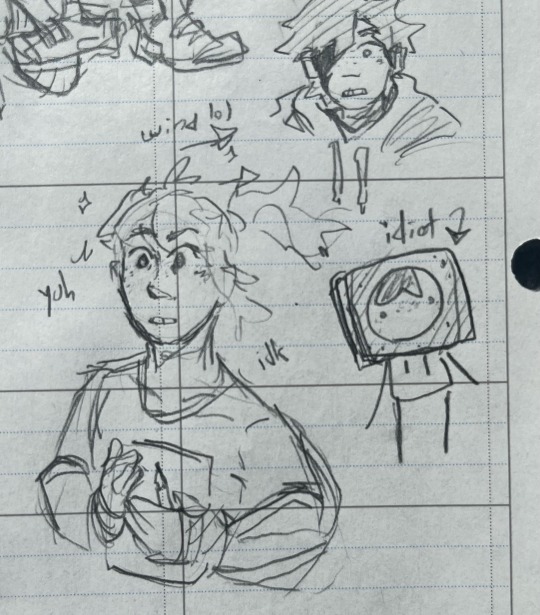

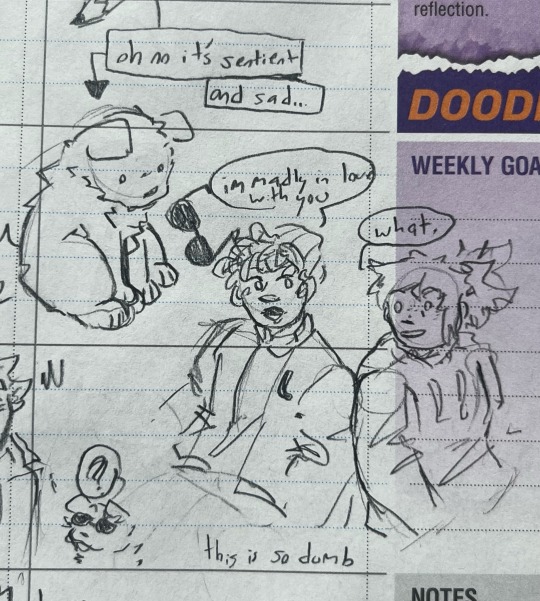

hello, yes, these are my very original characters.
#our drawings#I've recently become obsessed with this movie#beatboxing puppy#its the beatboxing puppy#Maybe if his microphone didn't constantly clip from his shouting he'd be a little more bearable
83 notes
·
View notes
Video
undefined
youtube
I have been rewatching clips of this and I'd forgotten how silly it could get, I need to rewatch the whole series again.
I love R. Dorothy Wayneright so much it’s unreal.
#I'm a sub man unless we're talking Big O or Cowboy Bebop#I was and still am in love with R. Dorothy#Top two anime crushes along with Sailor Mercury#I am having trouble dealing with the fact that this show is two decades old#This is as old today as shows like Macross and Armored Trooper VOTOMS were when it came out#Big O#This is one of my favorite anime of all time#Youtube
16K notes
·
View notes
Text
youtube
Footage from their 1966 American tour.

After their 1957 film, The Mysterians went on the road as a rock-n-roll band. Here they are with their manager, Bernie Tanaka, right before playing a gig before thousands of screaming Japanese teenagers.
#? and The Mysterians#One of the funny things about getting older is not knowing when the kids today are making a deliberate reference#Youtube
61 notes
·
View notes
Text
Interesting stuff, and good guidance on how to produce something worthwhile with these programs, which is otherwise rather difficult.
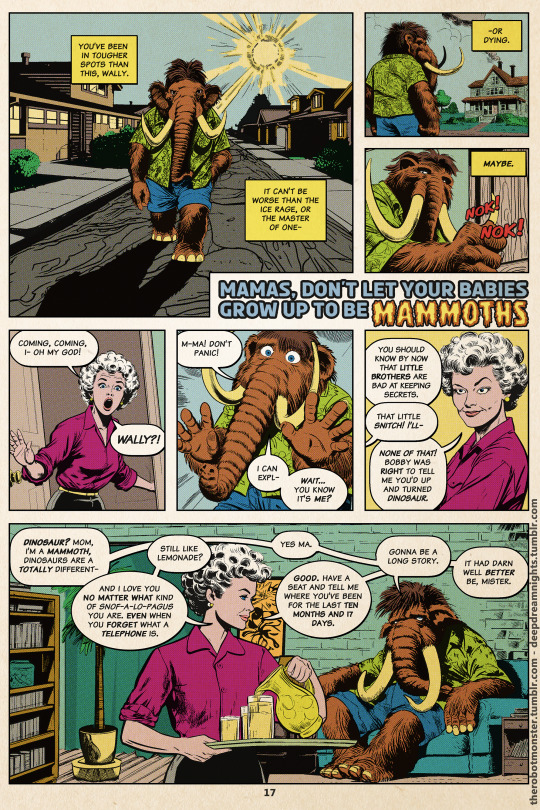
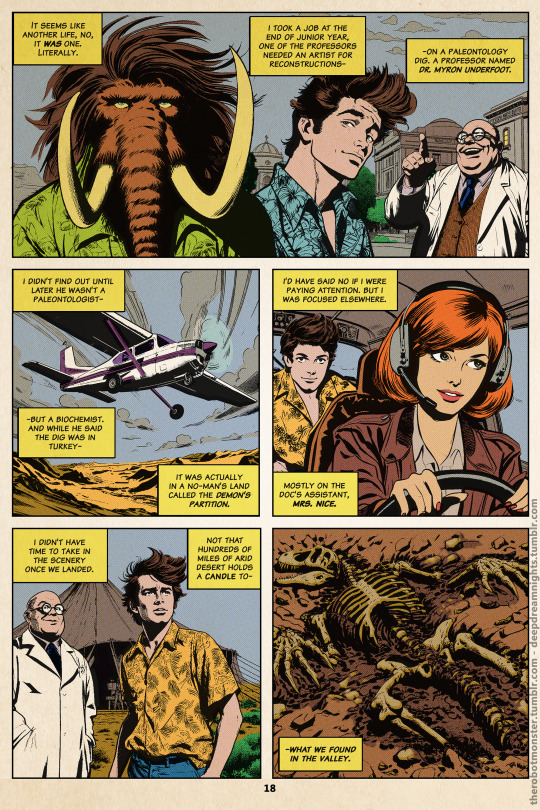
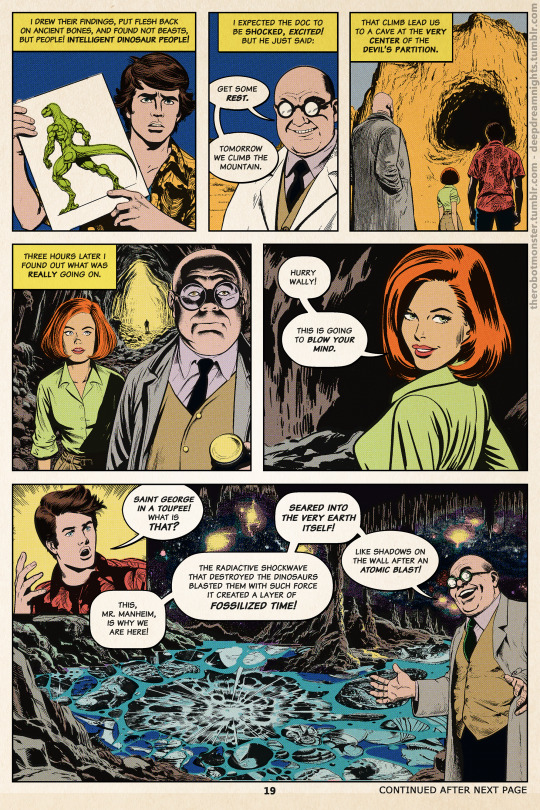
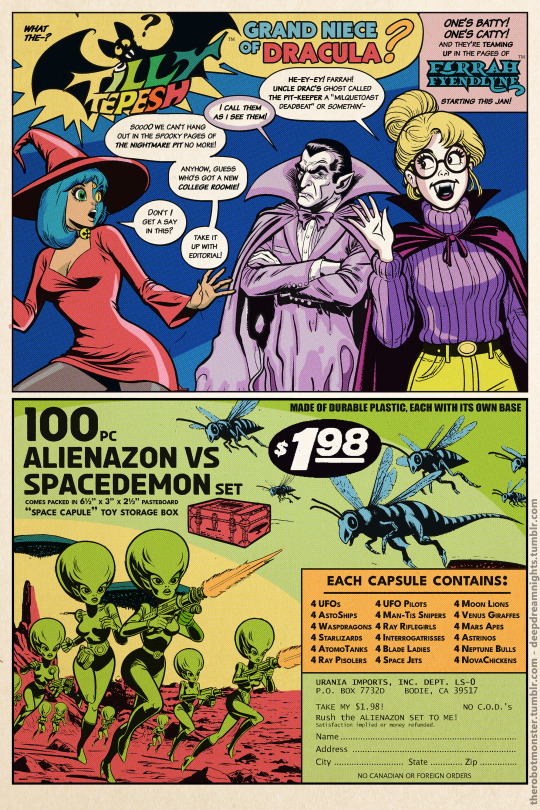
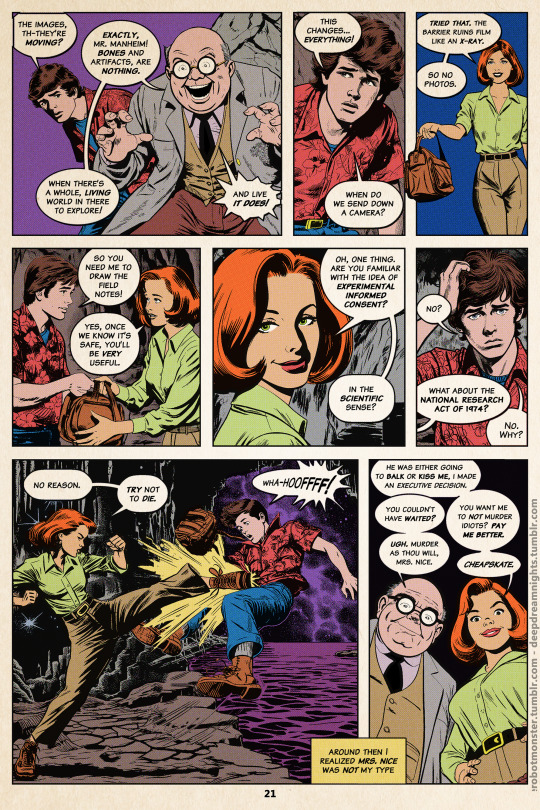
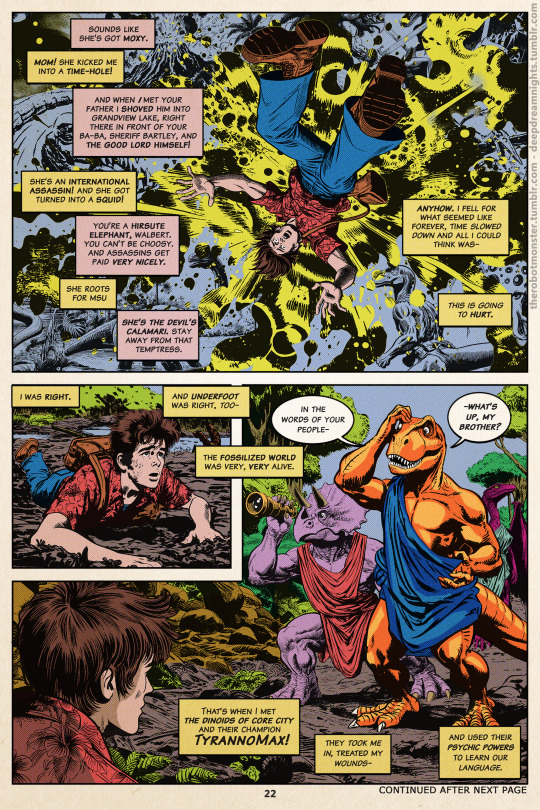
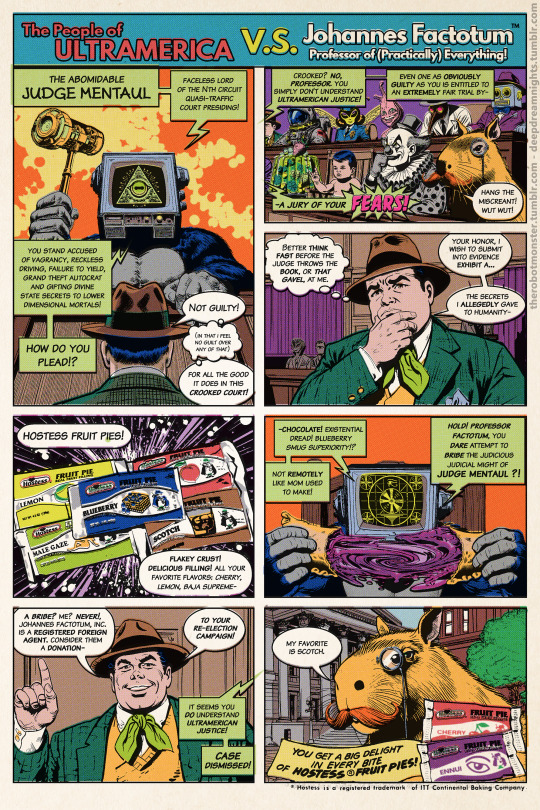
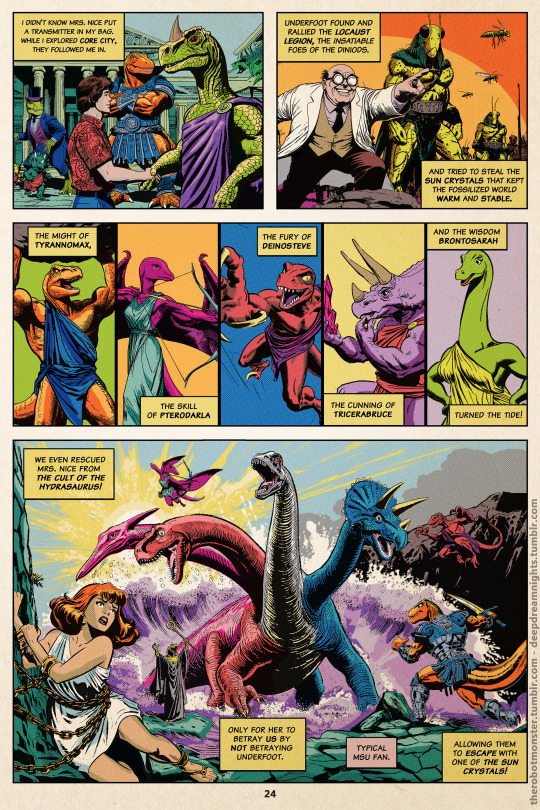
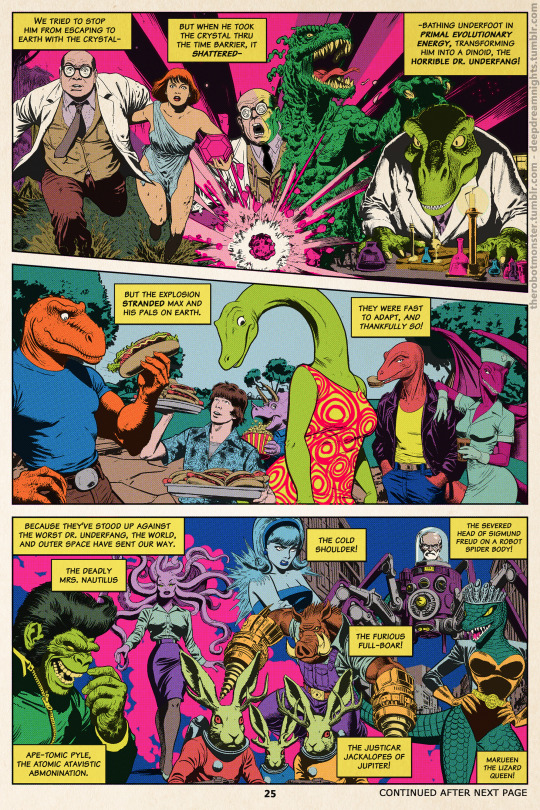
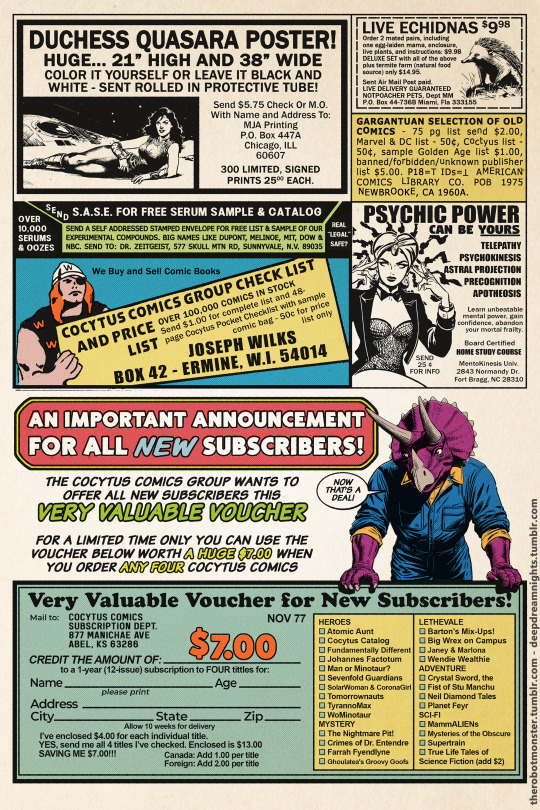
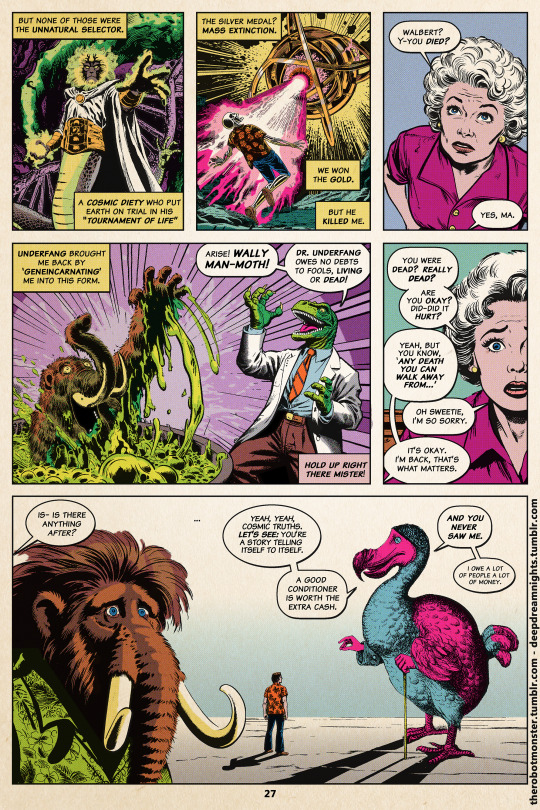
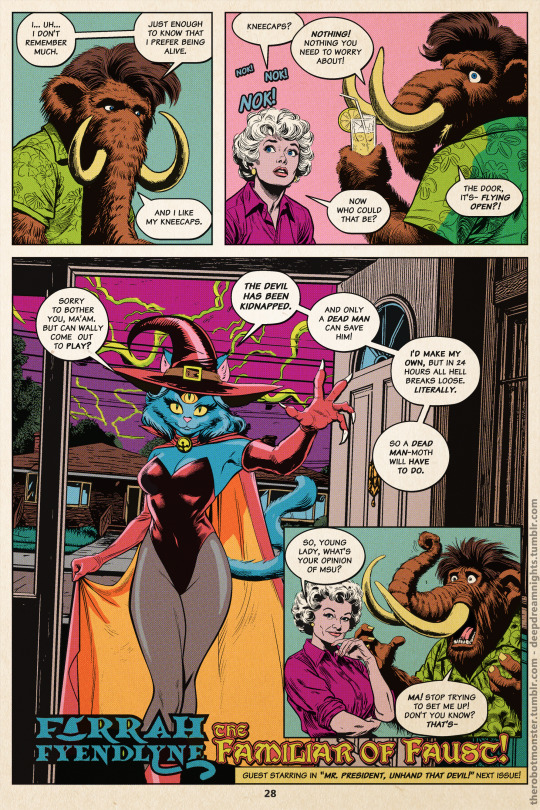
The Secret Origin of Wally ManMoth
Scans from TyrannoMax #26
Cocytus was one of the better-performing comic companies outside the big 2 in the 1970s before the whole company was bought out by Buzby-Spurlock Animation in the early 80s.
TyrannoMax was its biggest title, so almost everyone in the character stable teamed up with the Dinoids eventually.
Process under the fold.
TyrannMax is created via use of Dall-E 3 and Midjourney as pencilers, and me doing essentially everything else (writing, editing, inking, lettering, layout, etc.) DE is on most of the character art, MJ on backgrounds and select characters.
Each panel utilizes anywhere from one gen/prompt (for a handful of very simple head-shots) to around 20 for stuff like the DinoHydra action shot or the hero/villain showcase panels.
Once I know what I want for a page I lay out the rough dialog and panels, then start generating pics. Basic prompt format and a few examples:
, , , , comic panel by 1968, in the style of 1968
A portly 50 year old man, resembles Alan Hale Jr, jolly smile, wearing a tweed jacket, slacks, sandals, a fedora, sweatervest and a loosened ascot, full body character design, comic panel by Jack Kirby and Alex Toth 1968, in the style of 1968 Marvel comics
a mad scientist mid-transformation into a green anthro-tyrannosaurus, asymmetrical transformation, boils and growths, screaming/roaring, bald, portly, with round glasses. wearing a tattered lab coat, vest, slacks, tie. Comic panel by jack kirby and alex toth, 1968, in the style of vintage horror comics
Then I take the pics into PS, arrange and composite them, and then remove all the color. I don't tend to prompt for my final colors on characters and instead choose light tones I can easily extract. Why not just do B&W prompts? Style impact.
Then I start to re-ink over errors and details that don't match the mood I want, match line thicknesses over various elements, etc. Through this process I adjust dialog placement and panel arrangements, and do generally the things and editor and letterer would be up to.
Once I have the inks, flat colors, and the text on various layers, I do the weathering and compositing to simulate scans of a 1970s comic book. This is also where the deliberate flaws in coloring and print alignment are added for authenticity.
214 notes
·
View notes
Text
I've been thinking about this a lot.
I think that people looking back in nostalgia tend to over-emphasize political or satirical aspects of Fallout 1 and 2, and particularly 1, which really doesn't have much of a political theme other than ironic fascination with 50s consumerist futurism and its ironic juxtaposition with the threat of the cold war turning hot.
To the point where it would be hard to say more about those as themes in Fallout 1 beyond that exact single sentence.
Like I'd argue that from what I've seen so far in what I think is about the first third of Fallout 3 that it is more concerned with having thematic through-lines than 1 was and about as concerned with them as 2.
I've been trying to put my finger on why Skyrim kind of works despite itself and why Fallout 3 feels so weird and off, and I *think* that it comes from slightly differing design philosophies.
Fallout started with the idea of being a GURPS game and tried to create a game where you could make as many builds as you could in a pen and paper game, but in practice there are essentially three builds:
Shooty
Talky
Stealthy
(And in actual practice, if you are following a guide there's a specific character build that is good at all of the above)
These builds are ways to solve problems. You can talk things through, sneak past obstacles or fight them.
To the extent that the writing in Fallout 1 seems better than in Fallout 3 it's because it kind of has to be, if they're making a sandbox game where you make your own goals and talking is one of the ways to navigate obstacles. And even there Fallout 1 especially is kind of weak, there really aren't many Bad Karma quests and a bad karma playthrough is kind of dull.
But like, when it comes to the Master, you can physically fight him, or gather up evidence to convince him his plan is unworkable, and I think you can even just avoid him entirely and blow up his base (Could be wrong on this).
So, Fallout 1 and 2 are sandbox games where there is an overarching goal but you choose your own sub-goals and build a character that responds to challenges through either stealth, talking or fighting.
The Bethesda games I've played are close enough to this to be kissing cousins but also different enough to feel wrong.
Particularly, while they also make open world sand-boxes where you have a broad overarching goal but choose your own sub-goals, they're much more combat focused.
Basically, I'd say they are games where combat is the solution to all problems, and character builds are basically different ways of doing combat.
Speech and pickpocket are not so much ways of solving problems as they are ways of preparing for the next combat challenge and deciding which side of the combat challenge you are on.
So there's a lot less focus on moment to moment writing because the writing doesn't have to be as complex when it's not serving as a challenge, but rather a way to shuttle you towards the next challenge, which will be combat.
Also a lot of the writing in Bethesda games kind of is done as though that's not what's happening in the game design which throws things off too.
I can never get over how jarring the transition from Vault 101 to Megaton is. You've very clearly been set up as a sheltered individual suddenly thrown into a dangerous and unfamiliar situation in the most startling way possible and then as soon as you get to Megaton you walk into a bar and a stranger goes, "Aha, you look like a doughty soul with a thirst for danger, and it so happens I have need of such an adventure" and all the dialog options are variants of "Yep that's exactly what's going on, what kind of dangerous job can I take on for you" and there's like, not even the option to go, "Help I'm a confused teenager and I have no idea what's going on and this is the first time I've seen any violence how do I get food and shelter" it's really jarring.
Fallout 3 and 4 both have incredibly compelling openings for a different game than the ones they are a part of, it's a weird vibe.
Anyway to go back to the beginning I'm not really convinced Fallout 1 or 2 actually had strong thematic through-lines or "a question you're trying to answer as you wander the wastes" either and maybe 3 fumbles the ball but I think it makes a stronger start of having those things than 1, and probably as good or slightly better than 2. It's just the game design clashes with itself in ways that weren't really as much of a problem in the prior to mainline games.
Taking another crack at Fallout 3 and just thinking about the series.
A weird thing about the Fallout series is that Fallout and Fallout 2 were decently popular at the time, but by Fallout 2 the people in charge had basically decided that nobody actually liked the gameplay in them, to the point where, of the six sequels only one (New Vegas) actually tried to mimic the game design philosophy of the first two.
I guess from what I've played you could maybe argue for Fallout 3 as well to some extent, but...
The big things about Fallout 1 and 2 for me, gameplay wise are:
Multiple character builds that each play differently, with different strengths and weaknesses;
Quests in which there are several different factions playing against each other, where the PC can do everything from ignoring them to joining one or more sides, aiding one or the other or even playing them off against each other for profit;
You can be selfless, amoral or even outright evil and the quests are still satisfying;
The idea that quests change the world around you as different factions gain or lose power due to player actions
Now, neither of the first two games are perfect here. Fallout 1 in particular had the idea of a karma system but in practice there are barely any bad karma quests and they are strictly less interesting than the good karma ones.
Anyway Fallout 3 so far is a minor step backwards from Fallout 1 in terms of all of these design goals, and I'd say Fallout 4 is just... not even the same kind of RPG.
It feels even weirder given that games in the exact same genre as Fallout 1 and 2 are now incredibly popular.
PS - That said, I don't know if this is a hot take or not, but Fallout 3 and 4 are a lot more immediately gripping and thematically interesting from the very start than New Vegas, although I admit that I've played NV the least of any of the main series so maybe it gets a lot more interesting. New Vegas seems to be following in the footsteps of Fallout 1 and just using the wasteland as an excuse for a frontier adventure. 3 and 4 go, "Okay, if Fallout 2 is about blowing up the President of the US let's move the next games to the east coast and make them even more directly about America" which I think is a really solid idea.
37 notes
·
View notes
Text
There's a bit really early in Fallout 1 where you can talk to the town doctor about the radscorpions and he says,
"They seem to be extremely large versions of the north American Emperor scorpion. Contrary to my medical knowledge, their poison has grown more potent, not diluted, as I would expect. Seth has been hunting them, which helps some of my tests.
"And how such a large creature can even be possible by natural evolution, or even radiation induced mutation is beyond me."
What I thought on my second playthrough was, "Aha, this is foreshadowing the discovery of the Forced Evolution Virus"
The conclusion I drew, which digging through the Wiki I don't think is actually canon, is that the widespread presence of mutated FEV and radiation was responsible for things like the Deathclaw and that Super Mutants were essentially a human version of the Deathclaw, the kind of "average" way that luckless humans are mutated by the wasteland.
And that the Master had not so much *invented* super mutants as he had organized the existing ones and done his own work on perfecting the process with a particular eye on dealing with the intelligence losses from uncontrolled mutation.
Typing it up explicitly, this lies sort of oddly with their sterility, but given that people can become ghouls and then sort of end up sticking with other ghouls you could say that parents of Super Mutants usually exile them and they form groups of their own kind.
Honestly if I'd been writing Fallout 3 that's the retcon I'd have gone with, not like the series was shy on retconning.
I think it's better than having to have a new mad scientist invent them every game, tbh.
There's a question which the west coast Fallout games are quietly litigating, which is that age-old gotcha about what you do with the remaining orcs once you've deposed Sauron. In the original Fallout, the Super Mutants are basically universally aligned against the quote-unquote "good guys," for whatever value of that term is applicable to the wasteland at large, but subsequent games make it clear that this was an ideological thing, and a product of the political moment of the mutants creation rather than an ontological quality that they have. The game is very aware that this is something that was done to them, and the tragedy of that; the first mutant you're likely to run into is dying scared and alone.
Fallout 2 presents super mutants who've broken in every direction ideologically in the aftermath of the Unity's collapse; the peacemakers under Marcus at Broken Hills, Gond as a member of the abolitionist NCR rangers, reactionary remnants of the original mutant army, genocidal self-hating fascists like Frank Horrigan. Fallout: New Vegas iterates on this beautifully. The mutants dovetail perfectly with the theme of how every faction in the wasteland is trying and oftentimes failing to reckon with the weight of history. Their utopian movement imploded outside of living memory, closer to the apocalypse than to the present day. The survivors- who can only dwindle in number due to their sterility- have been left to reckon with that in whatever way they can. And they have their backs to about a hundred and twenty years of that reckoning not going particularly well, of being the bugbear and boogeymen for bullies and ideologues whose grandparents weren't even alive to suffer from the Unity's actions. The lack of a collective future for mutantkind casts a pall over even the best ending for Jacobstown; humans are collectively resilient within this setting, but through violence, and accidents, dementia and senility, the day will inevitably come when there are no mutants left. And worse still will be the day before that, when there's only one mutant left. Finding some form of satisfaction or contentment within that dwindling window, with the world against you, is a task that falls to the individual mutant. (Take Mean Sonovabitch, for example. He seems to be doing alright for himself.)
Then we slide on over to the east coast games, where the mutants are.... morons. Cannibals. Marauders. And when you meet one who isn't, the game throws itself a ticker-tape parade for containing such an audacious twist. To go back to the orc thing, it's like if The Hobbit had contained a lengthy, empathetic subplot about the rich internality and fleshed-out-if-deeply-flawed ideology of the orcs, and then there was a pivot to treating them like a monolithic block of ontologically evil marauders in LOTR. While staring you straight in the eye the whole time, unblinking. Daring you to say something
5K notes
·
View notes
Text
Taking another crack at Fallout 3 and just thinking about the series.
A weird thing about the Fallout series is that Fallout and Fallout 2 were decently popular at the time, but by Fallout 2 the people in charge had basically decided that nobody actually liked the gameplay in them, to the point where, of the six sequels only one (New Vegas) actually tried to mimic the game design philosophy of the first two.
I guess from what I've played you could maybe argue for Fallout 3 as well to some extent, but...
The big things about Fallout 1 and 2 for me, gameplay wise are:
Multiple character builds that each play differently, with different strengths and weaknesses;
Quests in which there are several different factions playing against each other, where the PC can do everything from ignoring them to joining one or more sides, aiding one or the other or even playing them off against each other for profit;
You can be selfless, amoral or even outright evil and the quests are still satisfying;
The idea that quests change the world around you as different factions gain or lose power due to player actions
Now, neither of the first two games are perfect here. Fallout 1 in particular had the idea of a karma system but in practice there are barely any bad karma quests and they are strictly less interesting than the good karma ones.
Anyway Fallout 3 so far is a minor step backwards from Fallout 1 in terms of all of these design goals, and I'd say Fallout 4 is just... not even the same kind of RPG.
It feels even weirder given that games in the exact same genre as Fallout 1 and 2 are now incredibly popular.
PS - That said, I don't know if this is a hot take or not, but Fallout 3 and 4 are a lot more immediately gripping and thematically interesting from the very start than New Vegas, although I admit that I've played NV the least of any of the main series so maybe it gets a lot more interesting. New Vegas seems to be following in the footsteps of Fallout 1 and just using the wasteland as an excuse for a frontier adventure. 3 and 4 go, "Okay, if Fallout 2 is about blowing up the President of the US let's move the next games to the east coast and make them even more directly about America" which I think is a really solid idea.
37 notes
·
View notes
Text
My take on The Batman was that the bad guys were just "Every kind of scary guy in the news right now mushed together into one" and as a result it was a fairly politically incoherent movie but since it's a superhero movie about punching dudes that isn't a fatal issue
Finally watched The Batman (2022) and it was very good, do recommend, but I'm also annoyed at everyone who was like "omg it was so on point of them to make the villain an incel!" because he was very clearly an accelerationist. and while I realise it was a lot of people just using the only Very Online White Man Terrorist word they knew the difference matters because while the ideologies frequently overlap they aren't the same and framing it as incel shit does a disservice to the film's showing you how he became an accelerationist. and in the current climate him being an accelerationist means the film is saying more than if it meant for him to be an incel and i just, argh, this is what studying the very online far right and having a film degree does to you
18K notes
·
View notes
Text
There's a scene in the latest Mission Impossible movie where the villain is meeting the hero on neutral ground, and, because he is being coached by a near omnipotent AI infecting the internet, he goes, "By tomorrow, one of you will be dead, and I will board the Orient Express, and leave it mid-day with the MacGuffin."
Of course, he's on neutral ground so there can't be a fight, but I've always wanted one of those scenes to end with somebody just shooting the bad guy to death and going,
"Honestly he was so smug I just wanted to prove him wrong, you know?"
#A friend pointed out that if you do this at the beginning of the second act your screenplay becomes exponentially more difficult to write#But I still want to see it happen some day
3 notes
·
View notes